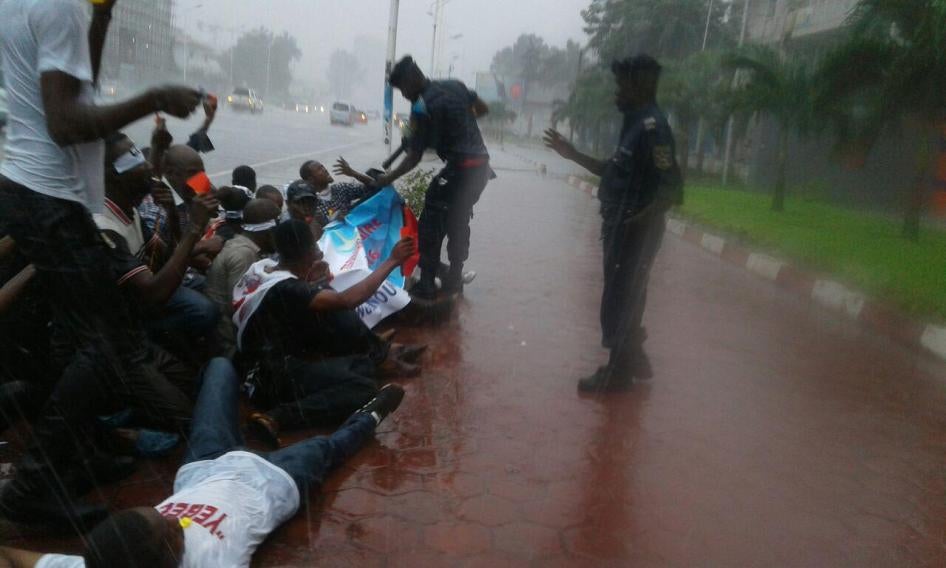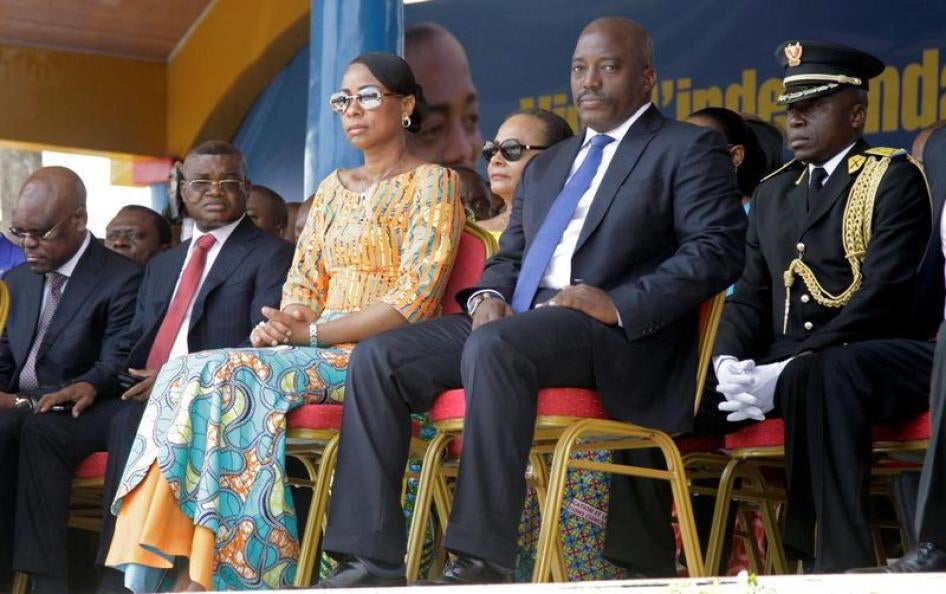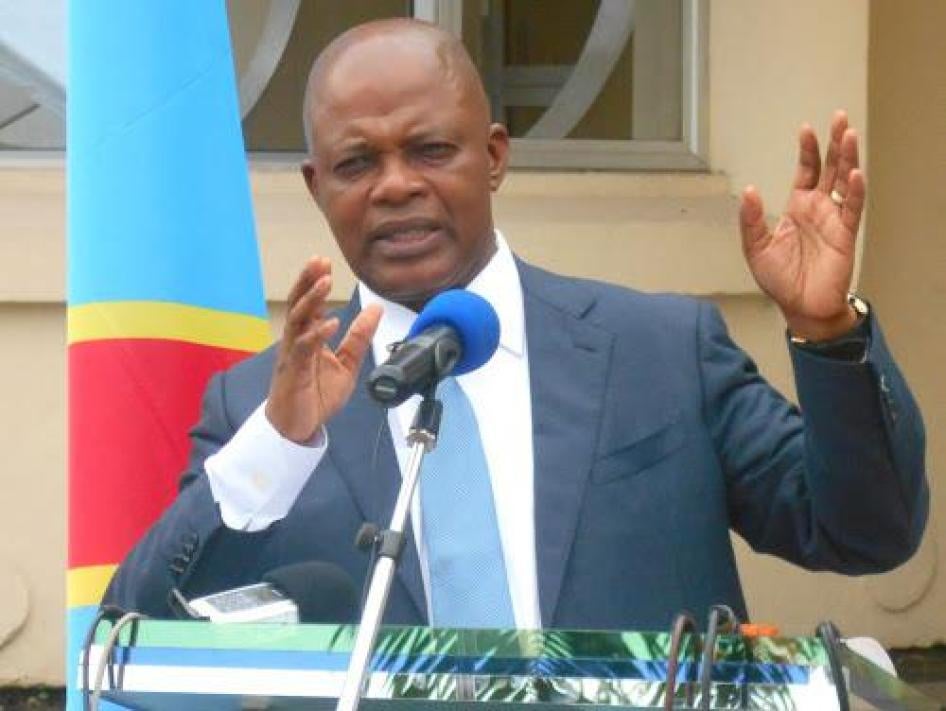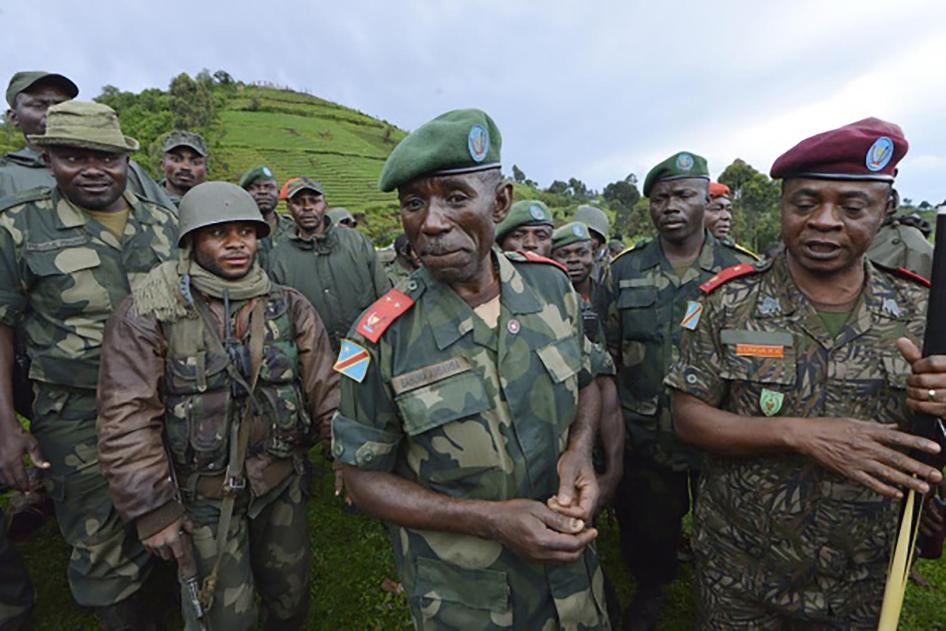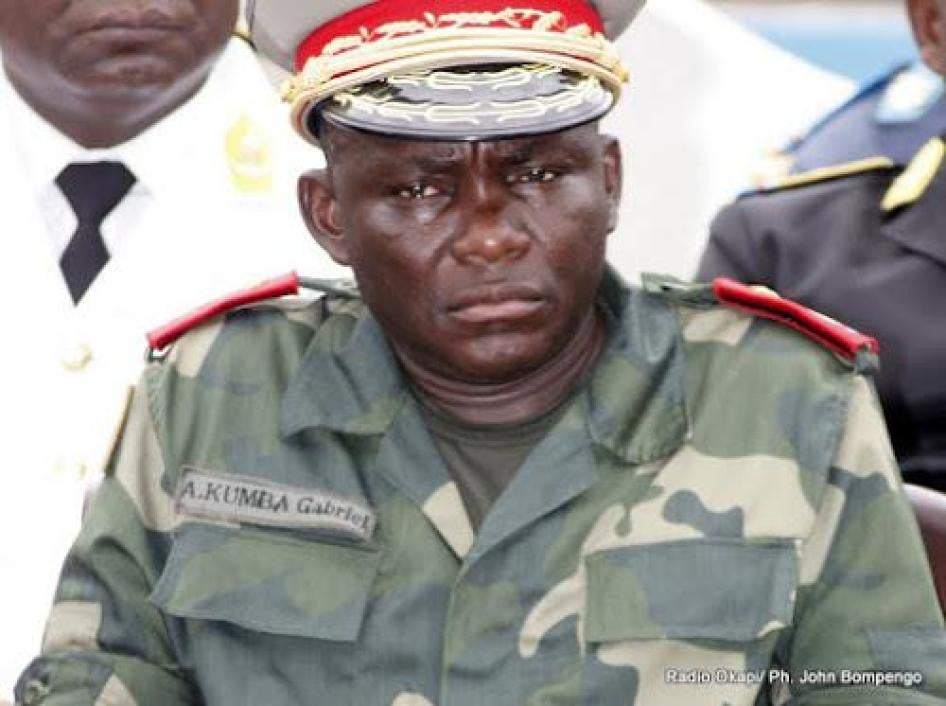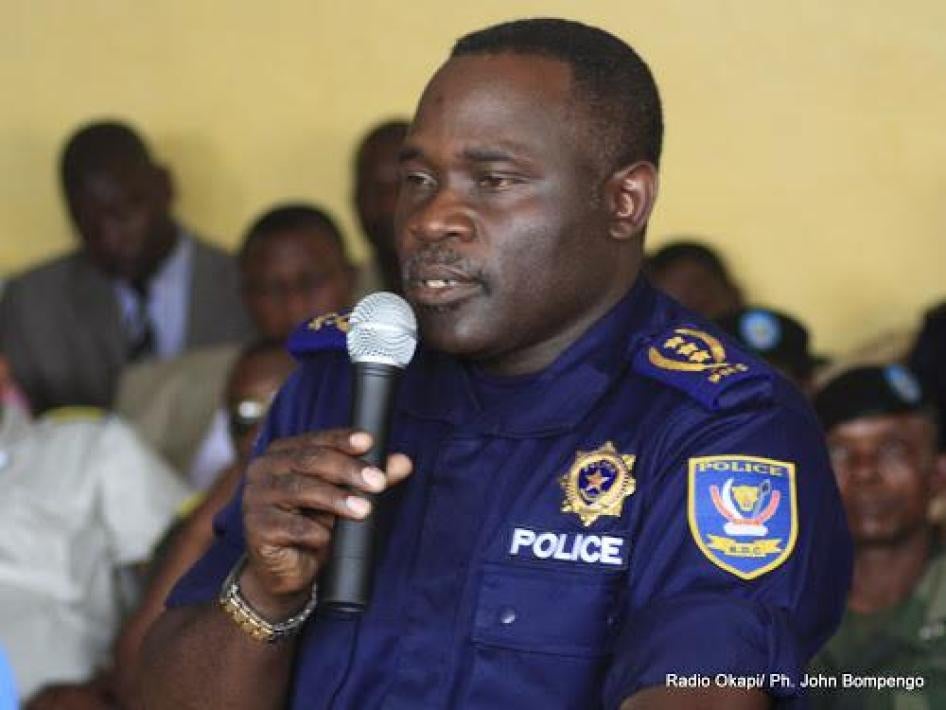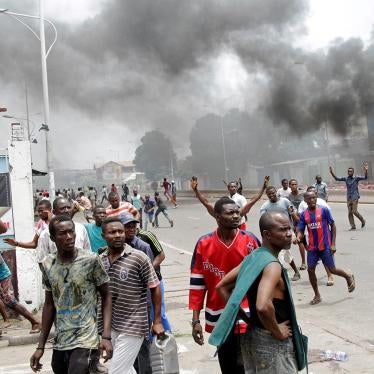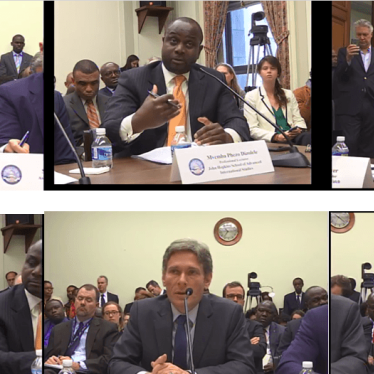On December 12, 2016, the European Union and United States announced targeted sanctions against a total of nine senior Congolese officials who have played a key role in the repression over the past two years.
The US sanctions, which included assets freezes, went higher up the chain of command than previous sanctions announced in June and September, targeting Kalev Mutondo, director of the country’s National Intelligence Agency, and Evariste Boshab, vice prime minister and interior minister, for “undermining democratic processes.” Mutondo and Boshab have been the architects of much of the repression over the past two years, as Kabila sought to hold onto power beyond his term limit.
The EU sanctions, which included travel bans and assets freezes, targeted four people who “contributed to acts constituting serious violations of human rights in the DRC, by planning, directing or carrying out those acts:” Ilunga Kampete, commander of the Republican Guard; Gabriel Amisi Kumba, commander for the western region of the Congolese army; Ferdinand Ilunga Luyolo, commander of the anti-riot body known as the National Intervention Legion of the Congolese National Police (LENI); and Celestin Kanyama, Kinshasa police commissioner.
The EU targeted three others for “trying to obstruct a consensual and peaceful solution to the crisis as regards the holding of elections in the DRC, in particular through acts of violence, repression or incitement to violence, or actions that undermine the rule of law:” John Numbi, former inspector-general of the Congolese National Police; Roger Kibelisa, interior director of the National Intelligence Agency; and Delphin Kahimbi, director of military intelligence.
In its declaration announcing the sanctions, the EU said that “additional restrictive measures may be considered in the event of further violence or the political process being impeded.”
Kalev Mutondo
As the director of the National Intelligence Agency (ANR), Kalev Mutondo has been among the principal architects of the government’s drive to repress political dissent. Human Rights Watch interviewed over a dozen government officials, members of Kabila’s majority coalition, and security force officers over the past two years about Mutondo’s role.
Mutondo’s intelligence agency arbitrarily arrested scores of human rights and pro-democracy youth activists and opposition leaders, many of whom were held incommunicado for weeks or months, without charge and without access to their families or lawyers. Some were tried on trumped-up charges – with Mutondo also allegedly playing a role in intimidating judges and dictating verdicts.
Some of those the intelligence agency detained in the government crackdown were badly mistreated or tortured, including with electric shocks and a form of near-drowning. Its agents have also repeatedly intimidated, threatened, and harassed activists, journalists, and opposition leaders or supporters, apparently as part of a broader campaign to spread fear and curtail their work.
Before an opposition demonstration in Kinshasa in September 2015, Mutondo was among several senior security and ruling party officials who hired men to assault peaceful protesters. Armed with clubs and wooden sticks, the assailants beat the demonstrators, spreading fear and chaos throughout the crowd of several thousand. Several recruits told Human Rights Watch that they had been called to a meeting with officials at a military camp in Kinshasa the night before, paid about US$65 each, and given instructions for conducting the attack.
The US imposed sanctions on Mutondo on December 12.
Evariste Boshab
Evariste Boshab, the vice prime minister and interior and security minister, has played an important commanding role in the repression over the past two years.
Since obtaining this position in December 2014, Boshab has been officially responsible for the police and security services and coordinating the work of provincial governors. These entities have repeatedly banned or repressed opposition demonstrations, jailed activists and opponents, shut down media outlets, and blocked opposition leaders’ freedom of movement.
Before the demonstrations in Kinshasa on September 19, Boshab signed a communiqué that was presented on national television announcing that all demonstrations were banned and that anyone who went outside would “face the rigor of the law and the police would do its job.” Many interpreted this as a green light to the security forces to crack down on demonstrators.
After the crackdown on demonstrations in Kinshasa in January 2015 and in September 2016, Boshab’s office deployed police officers to the main morgue and instructed morgue employees not to provide any information to journalists or human rights defenders about the bodies of victims killed during protests, witnesses said.
Boshab has also been implicated in efforts to bar international and Congolese human rights organizations and pro-democracy movements from operating freely in Congo. On November 3, Boshab instructed all 26 governors to prohibit the youth movements Filimbi and LUCHA from holding any activities because they were not legally registered groups. That runs counter to Congolese law, which does not require citizens to register their organization to hold a peaceful assembly.
The US imposed sanctions on Boshab on December 12.
Gaston Hughes Ilunga Kampete
Gen. Gaston Hughes Ilunga Kampete has been the commander of the Republican Guard presidential security detail since late 2014. The Republican Guard is a force of around 12,000 soldiers whose primary task is to guard the president. Under Congolese law, the Republican Guard has no responsibilities for maintaining public order.
During protests in Kinshasa in January 2015, security forces fatally shot at least 38 people. Republican Guard soldiers under Kampete’s command were among those who fired live ammunition into crowds of demonstrators. Republican Guard forces also fired indiscriminately in a hospital, seriously wounding three people. Human Rights Watch also documented several instances in which Republican Guard soldiers took away the bodies of those shot in an apparent attempt to remove evidence of the killings.
Members of the Republican Guard presidential security detail – including some Republican Guard units deployed in police uniforms – were responsible for many abuses during the September 2016 demonstrations in Kinshasa. Republican Guard forces fired on demonstrators, and attacked and burned opposition party headquarters, burning to death several people.
Several officers told Human Rights Watch that Kampete together with the army commander, Gen. Gabriel Amisi, led an operations command center in Kinshasa during the week of September 19 and gave orders to the security force units on the ground that carried out the repression. “The order was given to suppress the demonstrators so that they wouldn’t succeed in their mission,” one officer said. “The order was given to do everything so they didn’t enter Gombe [the part of the capital where most government buildings, the presidency, and embassies are located].”
Another said the orders were to “crush” the demonstrations. Republican Guard soldiers who would be deployed in Kinshasa the week of September 19 were allegedly paid bonuses on September 16 to motivate them for a strong response during the demonstrations, according to a security officer.
The EU imposed sanctions on Kampete on December 12.
Gabriel Amisi
Gen. Gabriel Amisi Kumba (known as “Tango Four”) has a long record of involvement in serious human rights abuses in Congo. An officer in then-President Joseph Mobutu’s army, Amisi joined the Alliance of Democratic Forces for the Liberation of Congo (AFDL) rebellion, backed by Rwanda, which ousted Mobutu in 1997. Amisi later joined another Rwanda-backed rebellion, the Congolese Rally for Democracy-Goma, and in May 2002, was among the commanders responsible for widespread killings, summary executions, rapes, and pillage during the suppression of a mutiny in Kisangani, Human Rights Watch found at the time.
The United Nations Group of Experts on Congo reported that Amisi was later allegedly involved in the trafficking of minerals, including tin and gold, while he was commander of the Congolese army’s ground forces. Amisi was suspended in November 2012 following accusations by the UN Group of Experts that he was overseeing a network distributing ammunition for poachers and armed groups. Congolese authorities cleared him of all charges in July 2014.
Amisi is currently the commander of the First Defense Zone, which covers Kinshasa and the western provinces. Troops under his command have been involved in the violent repression of political demonstrations over the past two years and excessive and unnecessary use of force.
During the September 2016 protests in Kinshasa, Amisi and the Republican Guard commander, General Kampete, led an operations command center in Kinshasa, several security officers said. The generals allegedly gave orders to the security force units on the ground that committed abuses.
Human Rights Watch found that Amisi and other senior officers and ruling party officials – including the Youth and Sports Minister Denis Kambayi – mobilized and paid youth league members to infiltrate the September demonstrations and instigate protesters to loot and commit violence. A youth league member associated with Vita Club, a soccer team that Amisi is the president of, told Human Rights Watch that he was called to a meeting in advance of the demonstrations and instructed to infiltrate the demonstrations.
The US imposed sanctions on Amisi on September 28 and the EU imposed sanctions on him on December 12.
Céléstin Kanyama
Gen. Céléstin Kanyama has been the provincial police commissioner for Kinshasa since December 2013. Kanyama officially reports to the national police commissioner, Gen. Charles Bisengimana, but also reportedly takes direction from other senior Congolese officials. Kanyama has a long record of alleged involvement in human rights abuses.
Between November 2013 and February 2014, Kanyama was the primary commander of Operation Likofi, a police operation purportedly aimed at cracking down on organized criminal gangs. He was responsible for giving the orders on the conduct of the operation, which entailed numerous grave abuses. Participating police officers summarily executed at least 51 young men and teenage boys and forcibly disappeared 33 others.
Kanyama and troops under his command were allegedly responsible for much of the repression in Kinshasa in 2015 and 2016 against activists, political opposition, and protesters, including arbitrary arrests and the crackdown on political demonstrations in January 2015 and September 2016.
Kanyama was also among senior security force and ruling party officials who hired men to assault a peaceful political demonstration in the capital on September 15, 2015.
When police commander of Kinshasa’s Lukunga district, he was implicated in violence during the 2011 electoral period, when police and other security forces killed scores of opposition supporters on the streets of Kinshasa.
The US imposed sanctions on Kanyama on June 23, and the EU imposed sanctions on him on December 12.
John Numbi
John Numbi is the former national inspector for the Congolese National Police. In 2008, he was involved in deploying about 600 police officers to repress the political-religious group Bundu Dia Kongo (BDK), based in Bas Congo. Human Rights Watch research at the time showed that during three weeks of police operations, the police used excessive and unnecessary lethal force. They fired at protesting BDK adherents, some of them violent, without adequate warning, killing over 200 and injuring scores of others. In some cases police deliberately killed wounded people, including those seeking medical treatment at health centers, running away, or otherwise in no position to threaten the police. The police systematically burned meeting places, homes, and other buildings belonging to BDK adherents. The police arrested over 150 suspected followers of the group, including people who had not participated in any actions against the police, and tortured or ill-treated some of them.
On June 1, 2010, the prominent human rights defender Floribert Chebeya, who had documented police abuses against the BDK, visited the police headquarters in Kinshasa following a telephone call telling him to go to Numbi’s office. His body was found soon afterward. Chebeya’s driver, Fidèle Bazana, remains missing. Following a widespread outcry in Congo and abroad about the apparent double murder that implicated Numbi, he was suspended as national police inspector on June 5, 2010. A high military court in 2012 refused to examine Numbi’s alleged role in the murder.
Although Numbi no longer has an official function, several government and security force officials told Human Rights Watch that he remains a close adviser to President Kabila and plays an influential role in security and politics in the former Katanga province. Three candidates for governor during the March 2016 gubernatorial elections in the four provinces making up the former Katanga province told Human Rights Watch that Numbi had threatened them and told them to withdraw their candidacies. A senior government official in Katanga also said that Numbi made death threats to opposition candidates during the gubernatorial elections, telling them to withdraw their candidacies and not contest the results. The official also said that Numbi is the “real governor” of the four provinces making up the former Katanga province.
The US imposed sanctions on Numbi on September 28, and the EU imposed sanctions on him on December 12.
Delphin Kahimbi
Gen. Delphin Kahimbi is implicated in serious human rights abuses in Congo, including involvement in arbitrary arrests, torture, and ill-treatment of detainees, especially of ethnic Tutsi.
In 2006, as the deputy commander of the 8th Military Region, Kahimbi allegedly arbitrarily arrested and detained people in his private residence in Goma. A man arrested in Goma in December 2006 alleged that he was beaten with a belt and tortured with electric shocks, including by Kahimbi.
In 2008, as second in command of the Congolese army in North Kivu and in operational command of the Kiwanja and Rutshuru area during operations against the National Congress for the Defense of the People (CNDP) rebel group, Kahimbi showed considerable hostility toward UN peacekeeping troops. He knowingly put peacekeepers and the civilians who cluster near their bases at risk of being caught in crossfire. As part of a broader failure to cooperate with the UN peacekeepers, Kahimbi also appears to have been involved in instigating demonstrations against UN peacekeepers, which led to restrictions on UN patrols, leaving peacekeepers frequently absent when residents were attacked.
As coordinator of the pre-disarmament, demobilization and reintegration process for combatants, Kahimbi alongside other officials failed to provide adequate food and health care to demobilized combatants, their wives, and children in a remote military camp in Congo in 2014. Over 100 of them died there from starvation and disease.
More recently, as commander of military intelligence, Kahimbi has been implicated in arbitrary arrests, detention, and mistreatment in Kinshasa in the context of repression against the political opposition and others. Norbert Luyeye, president of the opposition political party Union of Republicans (Union des Républicains, UR), was arrested with six others on August 7, 2016 at Luyeye’s home. On August 4, Luyeye had declared at his party headquarters that a legal vacuum would ensue if the National Independent Electoral Committee (CENI) failed to call elections in September, and called for a meeting in Kinshasa’s Ndjili neighborhood on September 4 to prepare for the September 19 demonstrations. The military intelligence services are detaining them all in Kinshasa without charge and without access to their families or lawyer.
Cubain Tshimbalanga, a member of the Congolese Solidarity for Democracy (SCODE) political opposition party, was arrested in Kinshasa on September 26, detained at the military intelligence headquarters in Kinshasa, and badly beaten before his release in early October. He was not charged or allowed access to his family or lawyers during his detention. Martin Fayulu, an opposition leader and president of the Engagement for Citizenship and Development (ECIDE) political party, was also detained for several hours at the military intelligence headquarters in Kinshasa on February 14, 2016, and a number of his belongings were seized.
The EU imposed sanctions on Kahimbi on December 12.
Ferdinand Ilunga Luyolo
As commander of the anti-riot police force known as the National Intervention Legion of the Congolese police (LENI), Col. Ferdinand Luyolo commanded troops implicated in the excessive use of force during demonstrations in Kinshasa in September 2016.
Several security force officers told Human Rights Watch that Colonel Luyolo commanded the Republican Guard units that were deployed in police uniforms during the September demonstrations, armed with assault rifles and grenades, and who were responsible for many of the killings. They also alleged that troops under Luyolo’s command were responsible for taking away the bodies of victims after they were killed.
The EU imposed sanctions against Luyolo on December 12.
Roger Kibelisa
As head of the Department for Interior Security of the National Intelligence Agency (ANR), Roger Kibelisa has been implicated in the repression of political dissent, including in the arbitrary arrest, detention, and mistreatment of scores of political prisoners. Many political prisoners and activists have been detained, held in inhumane conditions, and in some cases mistreated at the “3Z” detention center, the ANR building in Kinshasa where Kibelisa’s office is located. Detainees’ families, lawyers and human rights activists have regularly been denied access to 3Z.
One political prisoner who was detained at the 3Z detention center described an overcrowded cell swarming with insects where they were forced to sleep against each other “like sardines” as large rats crawled over their bodies. He said they had to relieve themselves in plastic buckets in the cell, spent much of the day in total darkness, and were only given food once a day – a spoonful of 18 beans when he counted. They were given one bar of soap for two people every two months, and were not allowed insecticide or razors to shave.
An activist who was detained at the 3Z said the guards regularly told them: “Here you are prisoners. You don’t have any rights.”
The EU imposed sanctions on Kibelisa on December 12.
